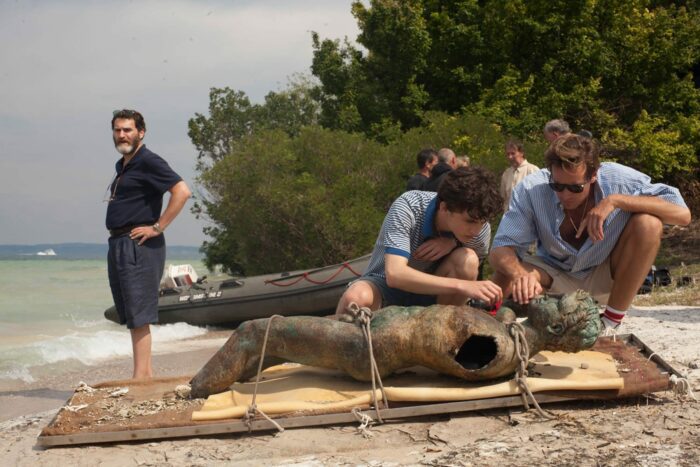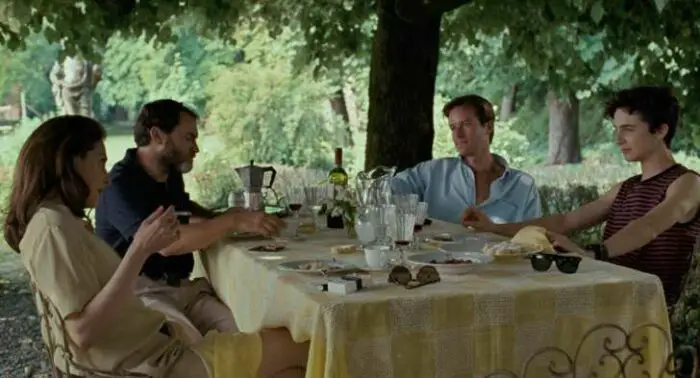June is Pride Month and here at 25YL, we want to look at TV and Film that made us proud with their representation of LGBTQ issues and themes. This week,Lindsay Stamhuis looks at Call Me By Your Name.
Humans are funny. We know that there is no real thing as Past or Future, that—scientifically-speaking, anyway—we exist in a series of present tenses that we artificially string together and understand as “the passage of time”. But we know that thing isn’t really real, that time doesn’t work like that.
Still, we mark these moments off in discrete chunks measured by the changes of physical things around us. For T.S. Eliot, a life could be measured in coffeespoons but for most of us it’s something far more celestial: the rotation of the Earth, the rotation of the Moon, one cycle around the Sun. These things are subjective, of course; observances imbued with meaning that we’ve constructed. “The test will be next week,” we say. “We’ve been married for ten years.” What we’re really doing is relating the passage of our own bodies to those in the heavens. I think that’s rather romantic.
It’s a peculiar human trait. We anticipate Futures that don’t exist yet; we get excited about them, we fear them, we plan for them, bring them into being, shape them into the thing we want them to be. We do this often to the detriment of our Here and Now; whole industries exist to remind us of that fact. But we continue to do it. We think forward, move forward, always moving, always going towards some unquantifiable Future State that never exists except to arrive and then, swiftly, pass into memory. And then that’s all the Past is. But we romanticize that too. Colour it with meaning, with the benefit of hindsight. And if that Past State is something particularly beautiful, we long for it. We weep for its loss.
Artists play with this in so many different ways but I’ve rarely if ever seen such an astute and powerful exploration of the passage of time, anxiety for the future and deep nostalgia for the past—real or imagined—as in Luca Gudagnino’s 2017 film Call Me By Your Name, based on André Aciman’s 2007 novel of the same name. Certainly no work of fiction has ever affected me as deeply and thoroughly as this did. I wanted to figure out why.
The story
Elio Perlman is a 17-year-old Jewish-American kid whose mother’s family has a villa in Italy and whose father is a professor of archaeology and expert in Classical statuary. It’s the summer of 1983, and Elio is bored, awaiting the arrival of his father’s summer intern, a 24-year-old grad student named Oliver who will be spending six weeks cataloguing slides, revising his own thesis, and working closely with Mr Perlman on the research that defines their professional lives.
When the handsome American student arrives, Elio is put off by his casual manners. He expresses frustration with Oliver’s dismissive and arrogant “Later”, uttered every time he excuses himself from their company, or the way he charms and disarms the prettiest girl in the village without appearing to even try. But Elio is as intrigued by Oliver as he is repulsed, and comes to desire more from the relationship than sharing silence in the garden. It isn’t long before Elio and Oliver exchange mutual sentiment and affection and begin a passionate summer romance that all-too-quickly burns out under the Lombardy sun. Oliver returns to America; Elio nurses his grief over the end of the affair. The two don’t speak again until Hanukkah when Oliver telephones to say he’s getting married, and Elio quickly realises that the chapter of his life containing Oliver is closed forever.
(The novel, written by André Aciman, takes things a step further, showing two more reunions over the years between Elio and Oliver, fifteen and twenty years after their initial summer romance. The pain and regret of those final pages lingered for me, personally, in a way that no other book has lingered; the film captures this in its final scene but it comes nowhere close to the emotion of the novel. I am curious to find out how the Aciman’s planned sequel, a novel called Find Me which is due out in October, will play out.)
Is it better to speak or to die?
Starring Timothée Chalamet and Armie Hammer as Elio and Oliver, the film is a beautiful, meandering travelogue through a very specific time and place and never forgets where that is. The 1980s atmosphere is set with music and fashion as well as the sensibility of the time; this was before AIDS had become the fearful killer it would soon be in the minds of everyone, particularly gay men. This spirit of freedom and the dramatic irony of what is to come pervades the atmosphere of every scene. It is only in the heat of summer that someone can become attached to another in the way Elio becomes to Oliver; he only ever does anything in order to be closer to wherever Oliver is.
Call Me By Your Name | “Dance Party” Official Clip HD
CALL ME BY YOUR NAME, the new film by Luca Guadagnino, is a sensual and transcendent tale of first love, based on the acclaimed novel by André Aciman. http://sonyclassics.com/callmebyyourname/ #Sony #CallMeByYourName #OfficialClip #LucaGuadagnino #TimotheeChalamet #ArmieHammer #ArmieHammerDance
The film and the novel both deal with the impact of anticipation and memory, the interplay of Future and Past with the Now of Elio’s story, in unique ways. The result is something unforgettable and undeniably poignant each time.
The novel dabbles in verbose poetic prose to allow us to live inside the youthful maturity of Elio’s mind. There’s a rambling incoherence to Elio’s narration that reminded me of early 20th-century modernist writing, like James Joyce and Virginia Woolf. The vitality of Elio’s words are particularly poignant. For all the emotional constipation that marks his initial interactions with Oliver, there’s a sensuality and a depth of feeling to his experience of that particular summer that leaps off the page. But of course, the novel has that benefit of written storytelling—a frame narrative, in which Elio can tell the story with the benefit of 20 years of hindsight and wisdom—which films often struggle to convey with any success. The novel brings to life Elio’s depth of understanding through the passage of time and the use or words. The film has to show this nostalgia in different ways, because for film Elio and Oliver the events are happening in an ever-expanding Now, not at some fixed Past.
In Guadagnino’s hands, the film becomes something different. Words are still vital to this film. But it has to rely on visuals a lot more; it’s a film, after all. Chalamet and Hammer depict several pages of exposition and description and dialogue in single aching glances or touches; every charged moment channels their feelings and emotions in ways that would normally take a paragraph or more to detail in written form. We see Elio’s confusion—his embarrassment over a sudden erection in front of Oliver before a daytime swim followed by Elio consciously and seductively leaving their shared doorway open by night—instead of discovering it through conversation, through words. “Show, don’t tell” is the writer’s maxim and the same holds true for filmmakers.
Guadagnino and cinematographer Sayombhu Mukdeeprom (Uncle Boonmee Who Can Recall His Past Lives) set this adaptation in that haziest of Pasts by evoking the warmth of summer nostalgia in each frame. Sun through leaves, the hiss of insects beside a hidden pond, storm clouds over Lake Garda, echoes of nighttime filtering in through large open windows, damp bare feet on dusty stone corridors and pop songs on a nightclub dance floor all call to mind summer’s unfocused allure and show us without a doubt that what we’re seeing is part of a Past that is in the process of being recalled. This is so far from Ray Liotta delivering freeze-frame voice-over narration.
And, just like all our own remembrances, there’s an intensity of feeling. In every single shot of Elio in his room or Elio in the garden or Elio anywhere in the blue-grey light of dusk, there is something so beautifully evocative of summer flings and first love. It’s there in the faded yellows and oranges of the Italian summer sunshine, too. It’s there in the artistically-rendered lens flares and the panoramic vistas of the Italian countryside. This is Elio retrieving Oliver—Oliver, who is so often filmed from below, exaggerating Hammer’s 6’4″ height, the Greco-Roman Classicality of his figure, and the way his presence looms so large over Elio’s life—from his mind, dusting him off, and pressing ‘Play’.
This is the stuff of Memory.
“The meaning of the river flowing is not that all things are changing so that we cannot encounter them twice but that some things stay the same only by changing.”
Heraclitus, The Cosmic Fragments.
As a brief sidebar here, it is likely no accident that Oliver and Mr Perlman are students and teachers, respectively, of archaeology; specifically, that they are in the business of cataloguing Roman statues. They are working with a very physical aspect of memory and history. This is something quantifiable; you pull a statue out of the ground and it is a memory come alive. It is a link to the past. The irony of course is that there is no true equivalent for Elio and Oliver. Oliver gives Elio his shirt, the blue shirt he wore when they first met and which Elio is wearing on the train platform when they part ways. But no one, save Elio, is going to dig for it once that moment is over. It’s a relationship fostered in secret and meant to stay secret, relegated to warm-hued memory. No archaeological digs will uncover this summer romance.
It’s also likely intentional that Hellenistic archaeology is focused on here. The practice of pederasty in the Ancient World is well-documented, and the parallels between Oliver’s “mentorship” of Elio through his sexual awakening are impossible to ignore. Of course, the way the film focuses on male bodies—the statues photographed on slides; Elio and Oliver’s bodies photographed by the camera—makes this link fairly clear. It’s almost as if Elio excavates his own sexuality by slowly chipping away at the earth surrounding this beautiful grad student sleeping in his bed. The film (and the book before it) seems to be very deliberately setting up these parallels to force us to question our deeply-held moral beliefs about age and sexual relationships. The grey area of ancient same-sex relationships is likely deliberately meant to contrast with the grey-area-morality of Elio and Oliver’s modern-day relationship, via our somewhat complicated relationship to age of consent laws (especially today, in an age of hookup apps and sexting).

Is it a video?
As sinfully-summer-saturated as the film is visually, the soundtrack is even more noteworthy. I don’t mean the New Wave synth pop or the classical piano, although that is part of it; it’s the original songs by American artist Sufjan Stevens that really make the soundtrack sing. Three of his songs are featured in the film—“Mystery of Love” and “Visions of Gideon” are original; “Futile Devices” was written for his 2010 album Age of Adz and repurposed for the film—and they each underscore the peculiar sense of urgency, yearning, and melancholy that accompany us in the throes of any love affair:
How much sorrow can I take?
Blackbird on my shoulder
And what difference does it make
When this love is over?
“I have loved you for the last time / Is it a video?” he sings over the end credits. The religious imagery of the song is undeniable—Gideon was a Jewish youth who commanded an army to victory after receiving visions showing him what he’d do; after the battle, the visions disappeared. But it’s also hard not to draw parallels to what we know is coming for Elio in the days and weeks and years ahead. His lived experience with Oliver, like Gideon’s visions, is gone, never to return.
All that’s left is the memory, fading and warping by the minute like the tape in a video cassette you want to play back over and over but don’t for fear of destroying it. And, like a video cassette—or a Polaroid, a faded photograph in an album—the overall warmth of the colour palette somehow both oversaturates and fades the scene in front of our eyes.
You can imagine that this is what Elio is thinking as he stares into the fire crackling in the hearth. Gone are the lush summer days beneath the apricot tree; all that’s left is the snow outside.
But memory is not a videocassette. It’s subjective and prone to romanticization. How can we really be sure that what Elio recalls is what actually happened? How can we be sure that anything recalled is what actually happened? If we asked for Oliver’s recollection, what would you find?
Memory is a tricky thing. But Call Me By Your Name is a memory, something golden and sweet but lost to Time and a Past that became Past before Elio had a chance to realize what was happening. Elio spends so much of the film itching to move forward. He’s always moving. Moving to that Future. His Now is six weeks, whittled down only to a handful of days; in the end, memory is all he has.
A Modern Romance
It used to be that same-sex couples in films could never have their happily ever after. In Brokeback Mountain, one character dies (and it’s strongly hinted at that he might have been killed for his sexual preferences, at least in the mind of his former partner) and the other is doomed to go on living a solitary life. In Philadelphia, AIDS claims the life of the lead character. There’s Boys Don’t Cry and Monster and The Children’s Hour, not to mention the biopics like Milk or The Laramie Project that depict the true stories of actual real-life suffering and death brought about by bigotry against the LGBTQ community.
This is what I expected with Call Me By Your Name. But I was surprised to find that, while it was still sad at the end, the tragedy was not because of death or bigotry but rather because of very normal, very average real-world concerns: Oliver leaves Elio behind to marry his girlfriend back home. It’s almost aggressively normal.
You could see this as a tragedy brought about by the strictures of heteronormativity in our society. But stories like Oliver and Elio’s bisexuality are not often told, and it’s important not to erase that fact entirely without good reason. The choice Oliver makes to marry his girlfriend is cold and heartless from Elio’s perspective, but it’s a reality that many people of every sexual preference face. And it doesn’t diminish the deep love he still feels for Elio. “I remember everything,” Oliver says to him over the crackling long distance phone connection. There’s no reason to believe he’s lying.
In this respect, Call Me By Your Name is still, at its core, a deeply romantic story, about two people who experienced something wonderful but transient, something that happened and now exists in vignettes: bike rides and swimming holes and thunderstorms and apricots.

There’s also the undeniable fact that Elio’s parents are, possibly, two of the most progressive and supportive parental units ever written in English literature. Elio’s mother knows all about the relationship between her son and her husband’s handsome American grad student—any observant and loving mother would see that. But she passes no judgment at any point in the film. Her concern is obviously for her son’s well-being. She obviously would rather he not have his heart broken. But this is unavoidable for any parent; our hearts are meant to break, and Elio’s is no different just because his was broken by another man. What Mrs Perlman does is provide the soft landing that Elio needs to recover from that heartbreak. When Elio and Oliver part ways at the train station in Bergamo at the end of the film, Elio calls his mother to pick him up. It’s with this understanding and deep love that she drives to get him. He doesn’t want to be alone with his heartache, and she won’t let him.
Elio’s mother is passively aware of his tryst; Elio’s father is far more upfront about it. His final conversation with Elio reveals that he, too, had a similar passionate relationship in his youth (I assumed that meant that he was referencing an affair with another man as well, but there are many readings to be made here). He urges Elio to continue growing and not seal off his heart from future pain, to learn from his father’s mistake before he is too old to do anything about it. The wistfulness of this conversation—one generation speaking with wisdom to the next about something that parents do not often talk about with their children with such frankness—is startlingly progressive, not just for 1983 but for now. (What a sad statement, that support and empathy for one’s child is seen as something surprising; would that this was the norm…)
I wish every LGBTQ youth had parents as supportive as Elio’s. Even if they have precious little to say about the age gap and questionable power imbalance in Elio and Oliver’s relationship, it’s a monumental step forward in healthy relationships and family dynamics not just in LGBTQ films but in film in general. The Perlman’s are a model of what every child—no matter their gender, gender expression, or sexuality—should have in their lives.

I can’t deny that Call Me By Your Name left a mark on me, both when I first watched it and when I first read the novel. Sexual politics, morality, beautiful cinematography and sound design and truly superb acting combine to make a film that was never meant to sit gently as mere entertainment. And it doesn’t. It’s a time capsule of a specific European pre-AIDS era in LGBTQ history. It dances deliberately and provocatively around ethically grey boundaries surrounding consent and age limits. It portrays universal emotions about love and romance and sexual awakening. It’s touching and raw and celestial and complicated.
It’s quickly become one of my favourite movies.
If you haven’t seen it, I hope this convinces you to give it a try.




Wow, I loved your analysis and your language. Well done <3 I love the movie so much as well.